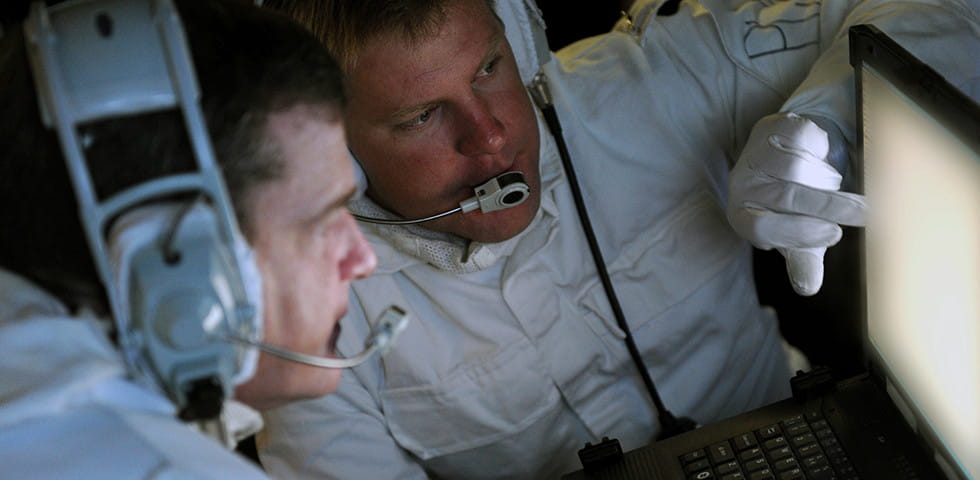Warfare Officer (Submariner)
In charge of sonar, tactical systems or communications, you’ll lead a team that acts as the eyes, ears and defence capabilities of its vessel.
- £31,000 - £110,500
- A-Levels / college qualifications
- Submarine Service
- Warfare
- Officer level
£5,000 Bonus
For earning your ‘Dolphins’
£31,000
£44,456
Extra pay
6 weeks
Travel

My job involves navigating or controlling the submarine, getting involved in the war fighting aspect, planning operations and tasking. It’s demanding but I really love the challenge of being a Submariner.
Role details
What you’ll do
As a Warfare Officer (Submariner) it’s your job to provide the boat’s eyes and ears, deep below the surface. That means taking charge of sophisticated sonar, tactical and communications systems, using your advanced maritime training to keep your crew safe. Whether you’re using your first-class navigation skills to help maintain our nation’s nuclear deterrent on a Vanguard-class submarine, or passing crucial tactical information directly to your Captain on hunter-killer operations, you’ll be in a position of real responsibility from day one.
Your role
- From starting as an Officer of the Watch, to becoming the Principal Warfare Officer, you’ll marshal a team of dedicated sailors in a unique and challenging environment.
- Use all the maritime skills you acquire during training, to keep the crew safe, which is your primary responsibility. That might mean negotiating a tricky underwater canyon, or even identifying and neutralising a potential threat.
- Provide leadership and guidance to the Warfare Specialists who are busy listening to, and reporting on, what’s happening around the boat. They’ll be doing a vital job, and supplying all the information you need to do yours.
- Stealth is a submarine’s primary weapon, and you’ll be key to ensuring the boat remains undetected, wherever you are in the world, and whatever the operation.
Pay & benefits
- A starting salary of over £31,304,
- Approximate salary £44,456 after two years
- A £5,000 bonus for earning your ‘Dolphins’ - the mark of a Submariner
- Additional pay starting at over £1200 per month at sea once qualified as a Submariner
- An excellent pension scheme
- Six weeks of paid holiday every year
- Free medical and dental care
Skills for life
Qualifications you'll gain
- We’ll make a significant contribution towards GCSEs, Masters degrees, and everything in between
- Gain internationally recognised professional qualifications as your career progresses
Skills you'll develop
- Gain the unique naval leadership and management skills that are highly valued by civilian employers
- Develop an in-depth knowledge of life as a professional seaman, from navigating and manoeuvring, to more advanced war-fighting skills
Eligibility
- You’ll need to be aged 18 to 39
- You’ll need a minimum of 72 UCAS points. These can be accrued from either GCE A/AS levels (or equivalent) or National Diplomas (e.g., BTEC)
- You’ll need at least 5 GCSEs at grades A*-C (9-4) (or Scottish equivalent), which must include English and Mathematics
- You must be a United Kingdom citizen or British Dual National. Dual Nationality restrictions do apply
- You must have lived in the UK for 5 years continuously prior to application
- A minimum height of 157cm
- A Body Mass Index (BMI) between 18 and 28 (between 17 and 27 if under 18)
Skills & Interests
- An ability to thrive on responsibility and lead from the front
- Confidence making key decisions
- Calmness under pressure and a love of teamwork
- A real sense of adventure
Joining Process
From picking your role to the first day of training; everything you need to know as an officer
Submit an application
Defence Aptitude Assessment (DAA)
You’ll be tested on: Verbal Reasoning, Numerical Reasoning, Work Rate, Spatial Reasoning, Electrical Comprehension and Mechanical Comprehension.
To prepare, you can practise the DAA
Interview
Medical and eye tests
Pre-Joining Fitness Test (PJFT)
This involves completing a 2.4km run on a treadmill within a certain time, at a fitness centre near you
Interview
You’ll have a short interview to assess your suitability for a career in the Royal Navy, and to ensure you’re ready for the Admiralty Interview Board (AIB)
Admiralty Interview Board (AIB)
This stage is unique to officers and takes place in two parts. A Pre Recorded Interview (PRI) is an online assessment which assesses your motivation to join the Royal Navy as an officer and your awareness of the Royal Navy. The Group Planning Exercise (GPE) is the second stage of the AIB and is an online competency based assessment which will take place on a separate day to the PRI. It will be conducted in a virtual group environment and you will be assessed on your contribution to the team based on your individual performance
Career Progression
Got a question?
Our virtual recruiter is available to answer your questions 24 hours a day
